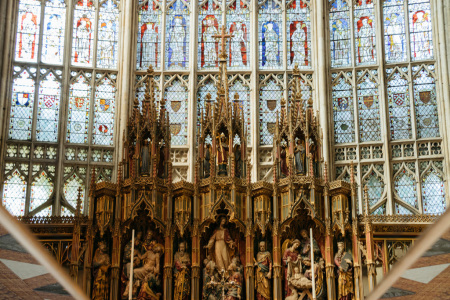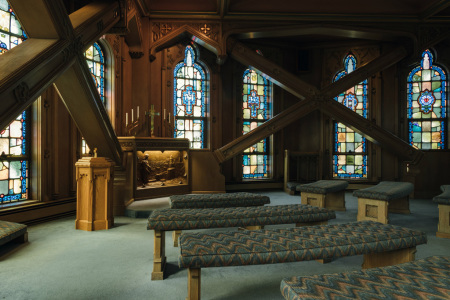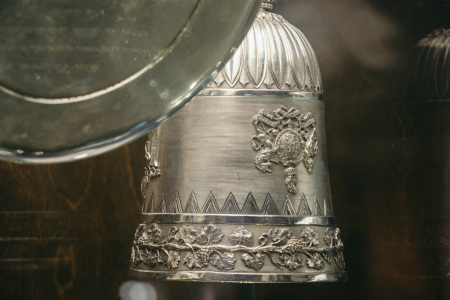With churches reopening, here are 3 old churches to visit
To say it has been a difficult six months for houses of worship is an understatement.
Hit harder are congregations with historic edifices, particularly those that rely upon admission charges or goodwill donations to cover the dual expenses of preservation and witness.
While the coronavirus pandemic continues to ebb and flow, many notable old churches and cathedrals are once again open to visitors.
Here are three of this columnist’s favorites.

Gloucester Cathedral
The Cathedral Church of St. Peter and the Holy and Indivisible Trinity — talk about a splendid name! — in Gloucester, England, is overlooked in a country full of spires and crosses.
Yet, visitors may recognize its 14th century cloisters, which feature the earliest example of fan vaulting, from the “Harry Potter” films. Gloucester Cathedral, as it is generally called, is old, but only became a cathedral during the English Reformation, when Henry VIII dissolved the monasteries and the former abbey became the seat of the first bishop of Gloucester.
In terms of the present building, it dates to the Normans in the late 11th century, although an earlier Anglo-Saxon abbey was here in the 7th century. The architecture, which varies from Norman to Perpendicular Gothic, blends seamlessly.
Of particular note are several church monuments, including the canopied effigy and tomb of Edward II, king of England from 1307 until his abdication in 1327. The great east window is truly great. As big as a tennis court, it was supposedly the largest window in the world at the time of its installation in the 1350s. Among the medieval stained glass are depictions of Christ in majesty and the Virgin Mary.
Be sure to also visit the crypt with its bold Norman arches and piers with Anglo-Saxon capitals.

The world’s tallest church
First United Methodist Church in downtown Chicago is the world’s tallest church.
The designation, however, comes with an asterisk because the historic Methodist congregation’s skyscraper consists of two distinct spaces.
The first, accessible through street level, is what’s used every day. It consists of a nave in the style of what could be called art deco Gothic. The second space is what puts the church, commonly called Chicago Temple, in the guidebooks. Located at the very top of the 23-story building, the Sky Chapel is accessible after climbing a couple flights of stairs — the building’s elevator doesn’t actually service the floor. It was added in the 1950s, thanks to the generosity of the Walgreen family of Walgreens drug store fame.
The chapel itself is small with space for maybe 20 or 25 people, which explains why it is only used for occasional services. The focal point is the ornate carved altar or communion table depicting Jesus weeping over Chicago. Flanking it are diagonal support beams that coincidentally resemble the cross of St. Andrew. Not only is the church the world’s tallest, but it is purportedly the oldest in Chicago — a city best known for its Roman Catholics — having been established by Methodist circuit preachers in 1831.

Quebec City’s Anglican cathedral
The first Anglican cathedral outside the British Isles can be found in Quebec City, the charming French-speaking city that hasn’t been French since British Gen. James Wolfe defeated the Marquis de Montcalm in 1759 during the Seven Years’ War.
The Cathedral of the Holy Trinity, seat of the Anglican bishop of Quebec, has a rich history dating to about 45 years after the British vanquished the French during an important but largely forgotten chapter of American history.
Architecturally, Holy Trinity with its Georgian expression of Palladianism resembles a parish church, not a grand cathedral.
The interior is instantly familiar to anyone who has visited the landmark London churches designed by Sir Christopher Wren. In fact, it is said to be an imitation of St. Martin-in-the-Fields, which faces London’s Trafalgar Square.
The real treasure is actual treasure that dates to the reign of George III, who had created the Quebec bishopric through letters patent in 1793. It was gifted to the cathedral by the king, who, like British monarchs to this very day, was supreme governor of the Church of England. The chalice, pitcher (burette) for wine, paten, collection plate and altar candlesticks, all of which are richly decorated, are on permanent exhibition under the gallery on the north wall of the nave. Also on display are an impressive edition of the Book of Common Prayer and the original wooden chest that carried everything to Quebec City.
Spires and Crosses, a travel column exclusive to The Christian Post, is published every week. Follow @dennislennox on Twitter and Instagram.
Dennis Lennox writes about travel, politics and religious affairs. He has been published in the Financial Times, Independent, The Detroit News, Toronto Sun and other publications. Follow @dennislennox on Twitter.





















